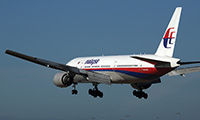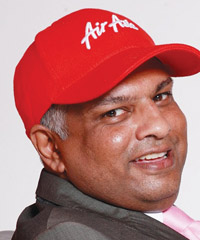News
Bloated MAS put on corporate diet
Malaysia’s government has approved the most radical restructuring of Malaysia Airlines in the airline’s history. The carrier’s new management must accept its imposed regime to avoid collapse.
September 1st 2014
In the final week of August, the 19,500 staff of Malaysia Airlines (MAS) heard the news of their new future. The soon-to-be fully privatized carrier will become a shadow of its former operating self, they were told, after the country’s Prime Minister, Najib Razak, had approved the survival strategy for the carrier a few days earlier. Read More »
At least 6,000 employees would lose their jobs and many long-haul routes would be abandoned. A new business plan would be put in place to restore the airline’s viability and reputation after the loss of 566 MAS passengers and crew and two of the carrier’s aircraft in March and July this year.
 |
Prime Minister Razak, who is also chairman of Khazanah Nasional, the country’s sovereign wealth fund, and soon to be MAS’s 100% owner, said the carrier must concentrate on its core Asian business while preserving some long haul routes to help feed traffic on its regional network. The new operating goal is to use its oneworld alliance membership to improve connectivity and feed. Alliance partners include Cathay Pacific Airways, Japan Airlines, Qantas Airways, American Airlines, Qatar Airways and British Airways.
Among several international services, MAS flies to London, Paris, Amsterdam and Frankfurt, with the latter the mostly likely route to be immediately cancelled. The restructuring aims to achieve “sustained commercial viability” in four to five years, said the prime minister.
At press time, no specific plans had been outlined for some of the airline’s other units, including its profitable engineering business. Sources told various media that more detailed plans for the restructuring would be worked out later, after the airline was fully privatized. Khazanah currently owns 69% of MAS and has put in process the necessary documents to buy the remaining 31% of the carrier.
MAS said despite increases in capacity and revenue, as well as cost savings and productivity improvements, it continued to report a weak financial performance.
“Our company has had to undergo a thorough re-examination and re-evaluation in order to reposition ourselves as a stronger and more sustainable MAS,” MAS said. Analysts have pointed out MAS has 108 airliners and 19,500 employees, while its southern rival, Singapore Airlines, operates 103 aircraft with 14,500 staff.
Not surprisingly, MAS’s financial position continues to deteriorate. Losses mounted in its latest quarter, ended June 30, with a loss of US$97.5 million, compared with a $55.9 million loss a year ago. The deficit for the first half reached $238.3 million, compared with a $144.4 million loss in the previous corresponding period. Analysts estimate the full year loss, to December 31, will be close to $1 billion.
MAS’s revenue declined by 5%, to $1.4 billion, for the reporting period. Available statistics show that MAS has lost $1.1 billion since 2005, while SIA made $7.1 billion, without a single year of losses, in the same period.
For many commentators, the rescue package is too tame and too late.
“Is MAS’s plan to de-list a privatization you have when you are not really having a privatisation? “To me, that is not a way out,” said industry analyst, Shukor Yusuf, after MAS’s major shareholder, Khazanah Nasional, made the expected decision to pay US$435 million for the remaining shares it does not own in the country’s flag carrier and to continue on its pledged path of restructuring at the airline.
“Its just a cheap, easy way out. By privatizing, you remove the ability of the industry to understand how the company is operating. It’s not the long-term answer to the survival of an airline that is losing $2 million a day and is carrying $2 billion in debt,” Yusuf said.
 |
| 'I just hope people will give Khazanah the chance to rescue MAS because something has to change. The less interference the better and that includes me' |
| Tony Fernandes AirAsia Group boss |
Yusuf repeated what the industry already knows. MAS has long-standing, deep-rooted structural problems. He said the carrier is salvageable, but that the fundamentals need to be changed, meaning the management and the structure of the company. “They need people with business acumen and industry knowledge to be brought in to run the company,” he said.
“To stand a chance of survival, to be rejuvenated, MAS must temporarily shut down because then you push away the creditors and put the loans and everything out of the way. Then you start re-structuring the company and its debt.”
Yusuf and other close watchers of MAS are concerned that full ownership by Khazanah Nasional, won’t introduce the necessary structural change required to keep the airline in business.
“Will there be new management? Will there be Board changes and will outside expertise be brought in? None of these questions have yet been answered,” said Yusuf when he spoke to Orient Aviation.
“There are many well qualified Malaysians working around the world with airline industry knowledge who could be persuaded to come back to help MAS. You could get expats, too, from Australia, the UK or elsewhere who could rebuild the airline over the next two or three years while they train people at MAS to run the airline long-term.”
Said Tony Fernandes, the AirAsia Group boss who has been asked if he would be involved in MAS’s restructuring: “it is not for me to comment on MAS. Khazanah has a lot of smart people. They have a lot of experience. I am sure that in due course they will announce a plan.
“I am focused on AirAsia. My future is AirAsia. I just hope that people will give Khazanah the chance to rescue MAS because something has to change. The less interference the better and that includes me.”
MAS said the de-listing is necessary because of the carrier’s financial situation. It argued private ownership would allow Khazanah to introduce an appropriate capital structure to meet its “substantial funding requirements” in the next few years and to sustain operations despite its debt.
Endau’s Yusof thinks major surgery is now required. “It’s called creative destruction. It’s been done before. Otherwise, MAS will end up like Pan Am. They will be in the annals of history,” he said.
“The aviation industry doesn’t owe MAS a living. If it were to go bankrupt tomorrow or disappear it’s not going to change anything in the scheme of things globally. Quite frankly, I don’t think anyone would be able to withstand the shock of having a second plane (MH17) down like this.
“The accident has nothing to do with the airline, but the name Malaysia Airlines is now synonymous with all the negativity you would link to an accident. It will have a very huge impact on the company for sure.”
Another aviation analyst, Mohshin Aziz from Maybank in Kuala Lumpur, has a similar view. “I can’t comprehend of anything they can do to save themselves. Perception-wise, it really hits home. It’s very difficult to fight against negative perception.” Even prior to the downing of MH17 Aziz considered the airline didn’t have the capacity to survive beyond a year.
In its statement about the de-listing, Khazanah said all stakeholders must work to save the company via a “complete overhaul of the national carrier on all relevant aspects including the airline’s operations, business model, finances, human capital and regulatory environment”.
“Nothing less will be required to revive our national airline so it will be a profitable, commercial entity that will serve its function as a critical national development entity.”
Within weeks what was a majority government-owned airline will become a wholly government-owned airline. That hasn’t worked for several years as exemplified by other government controlled airlines and their ultimate fates.
Conversely, identifying an outside private investor, be it another airline or a private group, prepared to finance a carrier in such deep financial trouble would be an immense challenge in the current climate say industry insiders.
| Search contines for MH370 As the world struggles to come to terms with the catastrophic missile attack on Malaysia Airlines Flight MH17 on July 17, the search for MH370, believed crashed in the Indian Ocean after disappearing in bizarre circumstances in March, resumed in August. Two state-of-the-art vessels , the MV Fugro Equator and the Fugro Discovery, owned by private Dutch company, Fugro Survey, will conduct a search in a 60,000 sq. km zone of the southern Indian Ocean. “The underwater search will aim to locate the aircraft and any evidence, such as debris and flight recorders, to assist the Malaysian team investigating the disappearance of MH370,” said Australian Deputy Prime Minister, Warren Truss. “The Malaysian government has offered equipment to assist in the search and there is a Chinese vessel operating in the area in relation to the survey,” Truss said. The Chinese naval vessel, Zhu Kezhen, has spent several months mapping the seabed in the search area around 1,800 kilometres west of Perth, Australia, based on the missing plane’s last satellite communication. The deep-water search could take up to a year and cost US$50 million. Both the Dutch vessels have towed deep-water vehicles and crew with search expertise to the search zone, Australia’s Joint Agency Coordination Centre said. The sea floor search will use sonar equipment and video cameras to locate and identify any debris. Truss said he remained “cautiously optimistic that we will locate the missing aircraft within the priority search area”, but added the search “will obviously be a challenging one”. Martin Dolan, commissioner of the Australian Transport Safety Bureau, the agency leading the search, said the underwater mapping survey that is due to conclude in mid-September was discovering “some surprises”. “We have not completed the mapping, so we are still discovering detailed features of which we had no knowledge - underwater volcanos and various other things,” he said. |